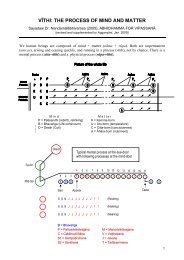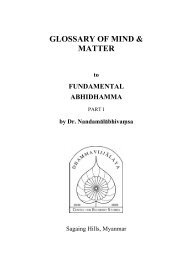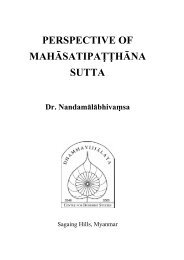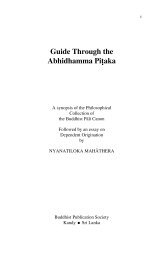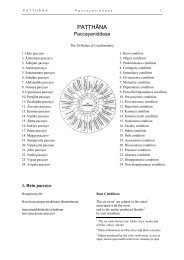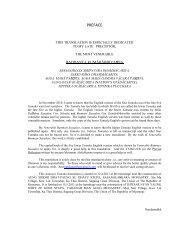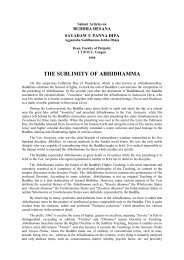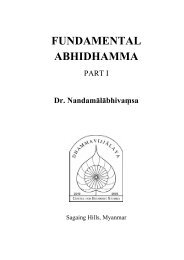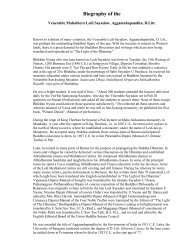ABHIDHAMMA IN DAILY LIFE - Abhidhamma.com
ABHIDHAMMA IN DAILY LIFE - Abhidhamma.com
ABHIDHAMMA IN DAILY LIFE - Abhidhamma.com
You also want an ePaper? Increase the reach of your titles
YUMPU automatically turns print PDFs into web optimized ePapers that Google loves.
Once upon a time, the Sangha assigns an immoral monk who was disliked by most devotees and<br />
donors. However, a donor was not despaired, having his mind directed upon the Order of<br />
Sangha, he respectfully offered food and other requisites to this bad monk. He treated this<br />
immoral monk as if he was Buddha himself, washing the feet of the monk as he arrived, seating<br />
him on a well scented seat under a canopy. Since he directed his mind onto the whole<br />
<strong>com</strong>munity, his charity qualifies as charity to the order of Monks, although the recipient is bad<br />
Bhikkhu.<br />
The same evening the bad Bhikkhu wanted to do some repairs to his monastery so he came to his<br />
donor to borrow a hoe. This time, the donor treated him with disrespect. He nudged the hoe with<br />
his foot and said rudely, "There!"<br />
His neighbor asked him about the two different treatments he accorded to the monk. He replied<br />
that in the morning his reverence was directed to the Order of the Sangha and not to any monk in<br />
particular. For his rude behavior in the evening, he said, "The bad monk, as an individual,<br />
deserved no homage or respect." This story illustrates that when offering alms or requisites to<br />
Monks, you must direct the charity to the order of Monks to receive the best benefit.<br />
6.1.1 j Offerings to the Buddha<br />
During the time of Gotama Buddha, devotees were given the privilege to offer alms to the<br />
Buddha in person. However, today the Buddha is no more with us in person. Therefore, we have<br />
to learn from the texts how to offer alms in devotion to the Buddha.<br />
First, you must prepare alms-food enough for one Bhikkhu and place in front of an image of<br />
Buddha. If there happens to be no statue nearby, you can create a mental image of the Buddha<br />
and offer alms and reverence to that image. Then you must dedicate your volition to the Buddha<br />
in person.<br />
After such offering, the alms food may be given to a devotee who does voluntary service in<br />
keeping the pagoda precinct clean and tidy, whether he is layperson or Bhikkhu. A voluntary<br />
worker who keeps uposatha Síla (Eight Precepts) can eat the alms-food before doing any service<br />
if the noon is drawing near.<br />
In offering robes in devotion to the Buddha the same attitude should be maintained. Monks who<br />
give voluntary services to pagodas are entitles to attire themselves in such robes. Care should be<br />
taken that offering flowers, incense or joss sticks, bouquets and water at the pagoda should not<br />
be<strong>com</strong>e a mess in front of statues and images. Your Charity must be given with tidiness, you will<br />
get good results in this life and hereafter. Your future existences will also be clean and flawless.<br />
6.1.1 k How to Pay Homage from a Distance<br />
Usually, most devotees pay homage and offer alms to the Buddha images in their own household<br />
because they cannot afford the time to visit pagodas and monasteries everyday. There have been<br />
arguments on whether this is a deed of merit or not. Since we have already learnt that the<br />
Page 47 A Gift of Dhamma Maung Paw, California




